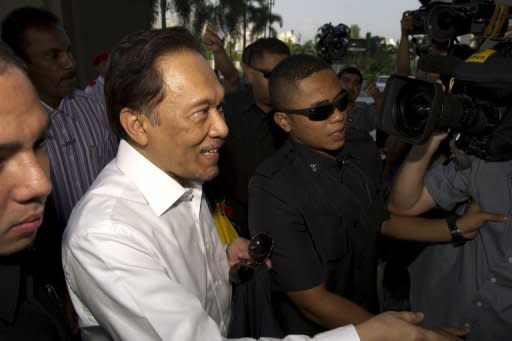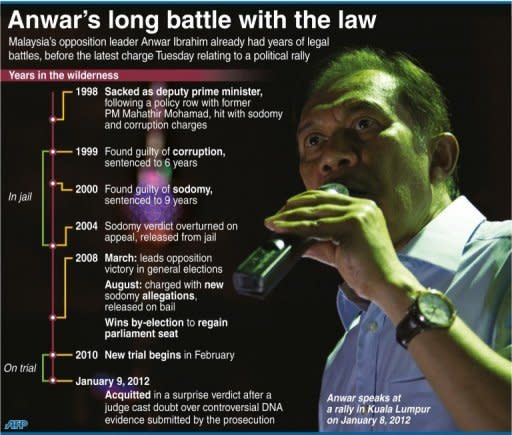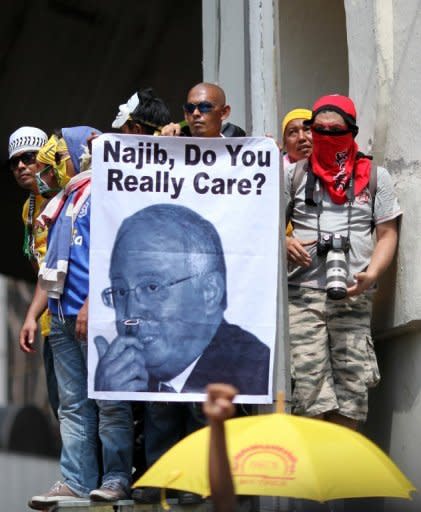Malaysia's Anwar charged, alleges new persecution
Malaysian opposition leader Anwar Ibrahim was hit with criminal charges Tuesday for his part in an election reform rally, a case he denounced as another government attempt to remove him from politics. Anwar and two party colleagues were charged with violating a controversial new law governing public gatherings and a court order that banned the April 28 rally from the centre of the capital Kuala Lumpur. The charge comes just four months after Anwar was acquitted of sodomy in a long-running trial that the charismatic leader has said was engineered by the government of Prime Minister Najib Razak to remove him as a political threat. "We will fight. This is political intimidation," the 64-year-old Anwar told reporters as he left the court in Kuala Lumpur after pleading not guilty. "Najib is afraid to face me in elections. I want to tell Najib not to use the courts and the flawed (assembly) law passed in parliament to intimidate political opponents." The judge scheduled a July 2 hearing to set a trial date, with the United States urging Malaysia to ensure "due process". A Malaysian government spokesman rejected Anwar's allegations of meddling. "The public prosecutor decides whether to press charges against an individual based solely on the strength of the evidence against them," he said in a statement. Anwar's lawyers and a top Election Commission official have confirmed that a conviction would strip the opposition leader of his eligibility to stand for election, although he could run on appeal. The charge of participating in an illegal protest carries a fine of 10,000 ringgit ($3,100) under the new law. In Malaysia, anyone fined more than 2,000 ringgit for a crime is barred from contesting elections for five years. Najib must call national elections by early next year, and many observers expect a tight contest after the Anwar-led opposition handed the ruling coalition its worst poll showing ever in 2008. Tens of thousands of Malaysians marched in last month's rally organised by electoral-reform group Bersih 2.0, demanding changes to an election system that they say is rigged in the ruling coalition's favour. Protesters breached barricades, touching off clashes in which police used tear gas and water cannon. The police were filmed beating protesters as other marchers fought back. The government has accused Anwar of inciting the violence, which he denies. Since his stunning 1998 ouster as deputy prime minister in a power struggle with his boss Mahathir Mohamad, Anwar has spent much of his time either imprisoned or fighting charges that he views as politically motivated. The new charges, which came to light Wednesday in a summons issued to Anwar, have triggered fresh criticism of the new law on public assemblies, passed late last year amid strong criticism from the opposition and human rights groups. Anwar, who was charged along with the two colleagues from his People's Justice Party, said they were the first people prosecuted under the Peaceful Assembly Act. Najib, who has sought to portray himself as a reformer, has said the act guarantees the right of citizens to assemble publicly. But it bans street protests, and critics say its various strictures make obtaining approval for a rally virtually impossible in urban areas. A statement by Anwar's party said the charges proved its earlier warnings that the assembly act was intended to prevent its leader rallying opposition supporters -- and throw him in jail if he does. "The political motivation of this new charge is clear. Having failed to stop Anwar with the trumped-up sodomy charge, (the government) is now trying again in desperation to stop Anwar's unrelenting march to (power)," it said. US State Department spokeswoman Victoria Nuland said: "We encourage the authorities in Malaysia to ensure that due process is protected and that any trial is conducted in a fair and transparent manner." Human Rights Watch called on the government to withdraw the charges and repeal the assembly act.





